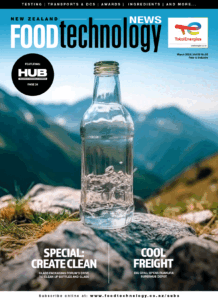
By Natalie Martin, 3R Group Materials Innovation Manager
If you make or sell beverages, you are probably aware of the Government’s proposed container return scheme (CRS), which would put a redeemable 20c deposit on just about all beverage containers.
The Glass Packaging Forum (GPF), which believes glass should be excluded from a CRS in Aotearoa, has released an alternative, extended producer responsibility (EPR) model designed by Grant Thornton.
The GPF claims the model, which would also be industry funded, would cost business less and result far fewer carbon emissions of the proposed CRS, while resulting in more glass being recovered and recycled.
The two approaches differ in two main areas. Firstly, the CRS will include beverage glass only, while the GPF’s EPR is for all container glass, including containers like jam and sauce jars.
Secondly, a CRS would incentivise people to return their empties to collection points and reverse vending machines with a redeemable deposit. A EPR model would continue to use existing recycling collection systems, and have no deposit.
According to the GPF the EPR model would boost recovery and recycling rates through investment and improvements to existing recycling systems, and a focus on glass quality, paid for by industry.
Both the CRS and EPR will require all of industry to participate.
So, which of the two options will ‘win out’? It’s difficult to say. The GPF’s EPR model has only been released recently and will need to be further scrutinised. It’s designed for glass but could potentially be adapted for other materials.
The proposed CRS has been brewing for several years and has strong support among the public and zero waste community. Its current design means glass must be included to make the numbers stack up.
Looking oversees we see many examples of countries running CRS for all materials, with varying results. There are also countries using both models in parallel and achieving high recovery and recycling rates. It would appear the recent trend is for glass to be excluded from a CRS such as with England, Northern Ireland and Singapore.
The Government has consulted on the CRS and is expected to make an announcement by the end of the year. So, whatever system, or systems, is implemented, there will be an impact on the food and beverage industry, and I highly recommend you look further into the detail.
For the CRS check out the Ministry for the Environment’s Transforming our Recycling consultation, and for the EPR visit the Glass for Good website.
Natalie Martin is the materials innovation manager at 3R Group in Hawke’s Bay. She has a background in food technology and over 10 years’ experience in new product development for FMCG and still supports the industry as a consultant. At 3R, Natalie works in new product development for various waste streams, including packaging.
The information and opinions within this column are not necessarily the views or opinions of Hot Source, NZ Food Technology, or the parent company, Hayley Media.


































































































